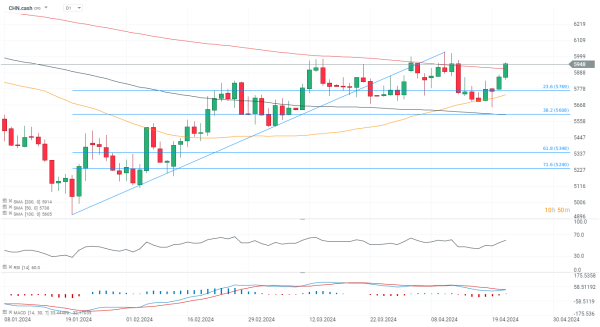Chinese stocks gain amid upgrade from UBS and Goldman Sachs 📈
Futures quotes for Chinese benchmarks are on an upward wave today. We can at least partly see the reason for this in comments from UBS and Goldman Sachs, which raised their forecasts for the Chinese stock market. At the same time, analysts lowered forecasts for indexes from Taiwan and South Korea.
Goldman Sachs
- The bank pointed to a more favorable risk appetite landscape for China's mainland stock market. The investment bank says Chinese stocks could rise 40% as a result of market reforms
- GS expects China's broader regulatory attempt to reshape its capital markets to result in a significant increase in stock valuations. A condition for even ca. 40% increase in GS's view is to close the gap with global leaders in terms of dividend payments, share buybacks, ESG and institutional involvement in the domestic market
- China's State Council recently created clear 9-paragraph guidelines to support the domestic stock market. The new guidelines are expected to emphasize the quality of listed companies, regulatory oversight and investor protection
- Goldman assessed that despite the challenging broader environment, the implementation of the changes could create the potential for Chinese business valuations to rise. In the baseline scenario mentioned by GS, valuations of Chinese stocks would increase by about 20%, if only China reaches global/regional average levels, in terms of the factors mentioned.
- Continental Chinese companies, on average, now allocate about 33% of profits to dividends, while European companies have paid out 60% over the past decade, and Japan 50%. Corporate share buybacks accounted for only 0.3% of total market capitalization in China versus 2.7% for the S&P 500 (average over the past 10 years).
UBS
- UBS raised its rating on the MSCI China Index and Hong Kong stocks, pointing to higher and resilient corporate performance and support from policymakers. The bank downgraded China to 'neutral' in August 2023.
- The Swiss bank backed Goldman Sachs' assessment. Earnings per share of companies included in the MSCI China Index have fallen by about 2% over the past 1.5 years. However, this is not a complete reflection of the situation, as some companies have a small representation in the index, but a large impact on earnings.
- China's largest businesses have performed well in UBS's view and have shown resilience, despite deflation and a difficult period for the country's economy.
- In the analysts' view, the biggest risk now is geopolitics, related to the U.S. elections in November. Potential catalysts are the observed rebound in consumption and high levels of savings, which will eventually find their way into the coffers of companies and partly into the markets as well. Tourism may also have a positive impact
- The Hang Seng and MSCI China indices are up 12-13% from their January, 2024 minima. Today, HK.cash and CHN.cash futures are gaining 1.5% and 1.1%, respectively.
CHN.cash (D1)
China's CHN.cash index is gaining more than 1% today and has broken above the 200-session moving average (SMA200, red line), which until recently was a very important resistance level. A rise above 6,000 points could herald a test of 6,300 points, the local maxima of November 2023. Source: xStation5
Source: xStation5